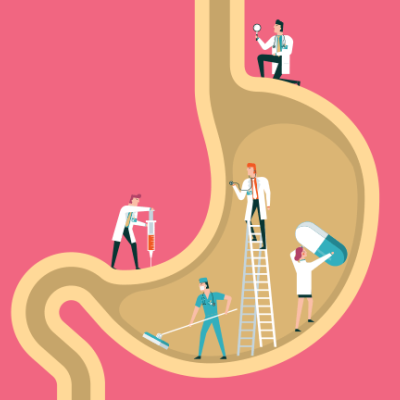Wednesday, 4 March 2020 / Topics:

The human gut is one of the biggest revelations in nutritional science and medicine in the past 50 years. Health professionals are increasingly recognising the hugely important role that the gut plays in physical and mental health.
To help us understand more clearly about the importance of gut health, Dietitian and co-founder of Sprout Cooking School, Themis Chryssidis has a chat to us.
So what exactly is your “gut”?
The term “gut” refers to the gastrointestinal tract, which includes your:
- mouth
- oesophagus
- stomach
- small intestine
- large intestine
- anus
Themis says, “The digestive tract is responsible for breaking down and digesting the food you eat. It extracts and absorbs nutrients into your blood stream, which are then used, excreted or stored for later use.”
Why is your gut so important?
We’re now learning about the role of gut health in terms of:
- Immune function – At least 70% of your immune system is found in your gut, which is why keeping it in top condition is so important.
- Autoimmune conditions – Healthy gut bacteria is linked to reduced symptoms of autoimmune diseases, such as Coeliac and Crohn’s disease.
- Weight management – A healthy gut has a positive effect on appetite regulation, total intake and metabolism.
- Mental health – Anxiety and depression have been linked with imbalanced gut bacteria.
Signs of an unhealthy gut
- Upset stomach – Gas, bloating, constipation, diarrhoea and heartburn can all be signs of an unhealthy gut.
- Unintentional weight changes – Weight loss can be caused by small intestinal bacterial overgrowth (SIBO). Weight gain can be caused by insulin resistance or the urge to overeat because of decreased nutrient absorption.
- Trouble sleeping – Serotonin which helps to regulate the body’s sleep cycle is largely produced in the gut, so any gut damage can impair your ability to sleep well.
- Skin irritation – Problematic skin is often a sign of an internal problem, most commonly with the gut. Gut issues and indigestion can affect the way the body absorbs nutrients from our food. This means that the vitamins, minerals and antioxidants that would normally nourish your skin are missing, potentially worsening skin conditions.
- Autoimmune conditions – Inflammation can alter the normal functioning of the immune system. This can lead to diseases where the body attacks itself rather than harmful invaders.
- Food intolerances – Food intolerances could be caused by poor quality bacteria in the gut. This can cause difficulty digesting certain foods and uncomfortable symptoms like gas, bloating, abdominal pain, diarrhoea and nausea.
What is “Good” and “Bad” bacteria?
Themis says “good” and “bad” bacteria exist throughout our body. He also says “a healthy microbiome (the environment where organisms live) ensures that bad bacteria otherwise known as pathogens don’t rapidly multiply and spread disease and infection by secreting toxins that impact normal cell function.”
Good strains of bacteria help to create a healthy immune system and slow and prevent the rate of growth of bad bacteria.
If the bad bacteria outnumber the good bacteria it can cause you to become sick and this is usually when antibiotics are prescribed. However, antibiotics can also kill good bacteria so it’s recommended to take a supplement or increase your intake of probiotics afterwards.
How do probiotics and prebiotics help with gut health?
Both probiotics and prebiotics are important for a healthy functioning gut, but they have two very different roles. Probiotics are beneficial bacteria, while prebiotics are food for the bacteria.
Probiotics
Probiotics are live bacteria found in certain foods or supplements. They can provide numerous health benefits.
Themis says when probiotics are consumed in adequate amounts, it can lead to improved digestion and immunity and even a healthy and happy mind.
Eating fermented foods is a great way to increase your intake of probiotics. They contain beneficial bacteria that thrive on the naturally occurring sugar or fibre in the food.
Some examples of probiotic foods:
- Sauerkraut
- Kimchi
- Kombucha tea
- Kefir (dairy and non-dairy)
- Some types of pickles (non-pasteurised)
- Other pickled vegetables (non-pasteurised)
Prebiotics
Prebiotics are basically fibre that is not absorbed in the small intestine. Once this fibre passes into the large intestine it’s then used to help reduce inflammation, keep the large bowel healthy and influence appetite regulation and immunity.
Some examples of prebiotic foods:
- Legumes, beans and peas
- Oats
- Bananas
- Berries
- Jerusalem artichokes (not the same as regular artichokes)
- Asparagus
- Garlic
- Leeks
- Onions
How to keep your gut happy
While every person has a different range of gut bacteria, it’s important to try to keep a healthy balance of bacteria.
Here are the top tips for a happy gut:
- Eat plenty of foods containing prebiotics and probiotics.
- Limit foods with high amounts of saturated fat and high sugar foods, like fried fast foods, soft drinks and sweets.
- Avoid consuming alcohol in excess.
- Manage your stress through regular exercise and consistent sleeping habits.
- Don’t smoke cigarettes.

